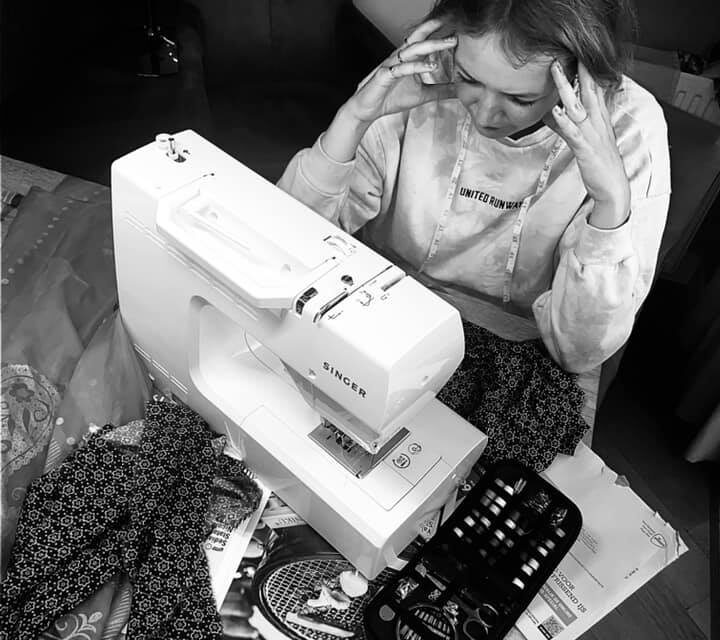A few months ago, negative stories about Amsterdam Fashion Institute (AMFI) started to come out. More and more students started to speak up about the unsafe environment at the school. But why are a lot of negative stories like this coming from the fashion industry, what makes this industry toxic?
Emotional damage, burnouts, teachers being bullies and racism. These were a few of the many complaints that students and former-students from fashion school AMFI were claiming. AMFI is a well-known fashion school in Amsterdam and everyone knows it’s hard to get in. Once you are in, the pressure doesn’t stop, because the work pressure is off limits. Students started to speak up and it even reached the Dutch government, who are doing a big investigation at the school now.
Sharon (22) is a former fashion design student at AMFI: “The teachers expected us to work every night during finals week. They said that sleep is the last thing you can think about.” Her experience at the school is not a positive one, at the end of her studies the massive workload resulted in a burnout. When she informed her teacher about it, he just said: “It is just something you have to deal with, burnouts are normal and part of life.” After hearing this, Sharon quit her studies at AMFI. “For me it was such a relief when I quit the school, after two years I finally felt free,” Sharon says. “For two years teachers have made me feel so incredibly insecure. Every assignment that I did wasn’t good enough. It was exhausting.” A lot of other students are having similar complaints. Students didn’t feel save in the school’s environment. “The use of drugs was normal at AMFI. The teachers knew about it and even tolerated it.” But why do these things happen at a school, a place that should be a safe environment? Students have to work nights after nights to finish a collection, models have to have size 34 to be ‘pretty’ and burn outs are normalized. But why? What is it about the fashion industry that makes it toxic?
A personal matter
Model Roos van der Heijden (21) followed the news about AMFI: “All the bad stuff that is happening at the school doesn’t surprise me at all.” Roos started working as a model a when she was just fifteen years old and modelled for high-end brands like Chanel and Louis Vuitton and was featured on the cover of Vogue. “Working as a model, I have experienced similar things. The fashion industry is extremely harsh.” “Many people assume that the fashion world is all about glitter and glamour, and in some way it’s true,” Roos continues. “I feel blessed that I am able to travel for my work, meeting talented people and wear beautiful clothes. But I also saw the other side of the industry.” She knows a lot of girls with eating disorders because of the high demands models face in the industry. “My parents were very strict, and really checked it I was eating enough. But a lot of girls were doing it alone and didn’t have support from their parents. I saw girls getting thinner and thinner until they ended up in the hospital, it was horrible.”
As a response to the question ‘what makes the fashion industry so toxic?’, Roos continues: “Fashion is about not about regular beauty, but about beauty that sometimes, goes beyond reality. Size 32 or 34 is not reality, however, in a lot of people’s perspectives, it is the beauty standard. And size 40 or 42 is not. Beauty is also personal and individual, I believe that is what makes it so toxic, because it really involves human beings and the way they look, weigh and work. It is a real personal matter if you get criticised in this world, I think that makes it so toxic. Also, the people that are successful in this world, are very successful. Since it is very hard to ‘make’ it in this world. Because of that people become arrogant when they make it. They feel like they can handle the whole world, and nothing can stop them. They think it’s allowing them to act horrible and only think about themselves, that makes it toxic as well.”

Models have to check their sizes regularly.
Not toxic, just stressful
“I don’t like the word toxic; I rather refer to the fashion industry as stressful. I think the most stressful part of this industry is that everything is very personal. When I design clothes, it is mostly based on my preferences and taste. If someone doesn’t like it, it could feel personal, but the trick is not to feel like that,” suggests designer Frank de Rooy (53). Frank is a designer with his own footwear brand in Germany and teaches at another fashion school in The Netherlands. He has been in the industry for quite some years. “The people who are successful in the fashion industry gave it all, they worked their asses off to make it. New students who have the same dream and goals, are expected to do the same. It doesn’t matter if you don’t sleep for a week, it is just what you must do. People can call it toxic; I just call it pursuing your dreams.”
Merel Tibboel (21) is a designer from a younger generation. She also studied at a fashion school, but not at AMFI. “I could recognize the things that happened at AMFI. The teachers at my school could really make you feel so insecure about your work, and yourself.” Merel continues: “I understand that people talk about the fashion industry in a way that you can call it toxic. However, I don’t have that negative association with it. I think a down-to-earth mentality is very important and try not to take things personal, because if you start to take things personally, things can come across as toxic.” But will the fashion industry ever change? Both Frank and Merel don’t think so.
Power abuse
“The psychology behind these things is quite interesting”, Klaas-Jan Klatten (53) says. Klaas-Jan is a psychologist who specialized in the psychology behind power abuse. “People who are being told they have a lot of power, influence or success are likely to be less modest and consider interest of other people to be less important. It is like the more successful they become, the less social as well.” An interesting experiment about power abuse is the prisoners experiment from Philip Zimbardo. For this experiment they rebuild a prison and the people who entered the prison were told to be a prisoner or a guard. The people who are told to be a guard and thus felt like they had power over the ‘prisoners’, started to act really anti-social. In the end they had to stop the experiment early because the guards became egoistic, and it got out of control. “You can easily refer this back to the things happening at AMFI or in the fashion industry in general. I know that a lot of teachers at AMFI are also very successful in the fashion industry, I think that is giving them a kind of powerful feeling. A feeling that they can behave in every way they want”, says Klaas-Jan. “I also read a lot of research about designers in the fashion industry. They feel like they are the most important because they design the most important thing: the clothing. This gives them the feeling they are superior and thus, a lot of power. They feel like they can treat everyone the way they want to, because they are still the most important” , Klaas-Jan continues. “Of course, not everyone who is successful will behave like this. But to quote Philip Zimbardo: ‘Everyone is able to abuse their power.’ However, some people chose not to and are very aware of their position. It is a very personal matter. But we need more people who are aware of their power and handle it responsibly.”
Sophie Kuijpers (25) was still in high school when she was scouted on the streets to become a model. Now, many years later, she is not doing modelling work anymore. In this video Sophie tells her experience and her vision on the modelling world.
[embed]https://www.youtube.com/watch?v=fYCMTEoGb-4[/embed]So, why is the fashion industry so toxic? First of all, it’s about the whole personal aspect that the fashion industry carries. The fashion industry is about beauty. It is about the most beautiful clothes, shoes, brands. The most beautiful models. Beauty is something we can all recognize in this world. Everybody can acknowledge beauty. However, not everyone thinks the same things to be qualified as ‘beauty’ and that is the thing that makes the fashion industry very personal. It is this kind of subjectivity that can make it toxic. Models are judged on only their looks, that is very personal. Designers are judged on a collection that they worked nights after nights on, that is very personal. And go so one. Second of all, the psychology of power abuse. The power struggle in the fashion industry, which can lead to power abuse. It is a fact that if people are told they have a lot of power or success, they are more likely to consider the interest of others as less important. So, the combination of people who are not aware of their position and thus abusing their power and the fact that everything about the fashion industry is very personal, can make it very toxic. Fashion will remain to be in our lives forever and the fashion industry will probably remain to be as hard as it is now. But luckily more and more people are starting to speak up and don’t tolerate things no longer. And maybe a new generation will turn thing around.




